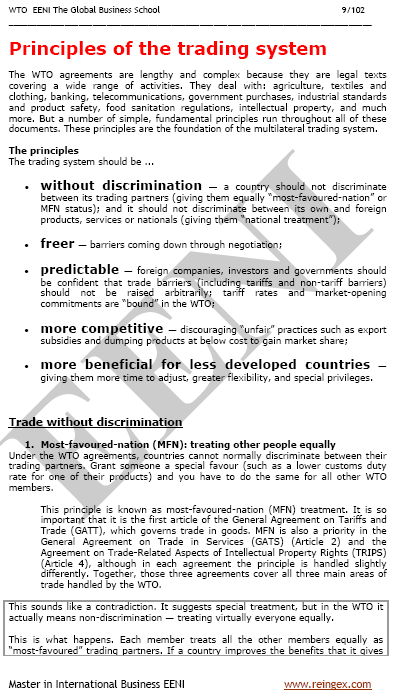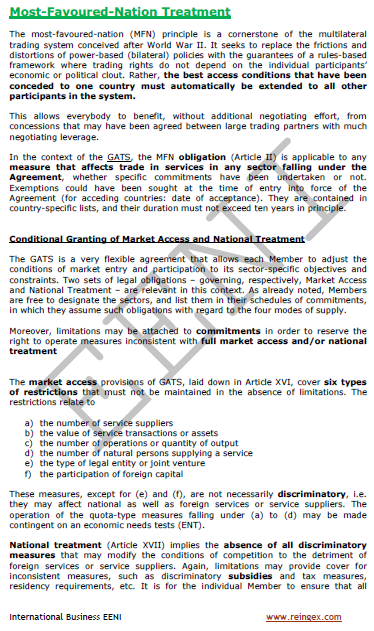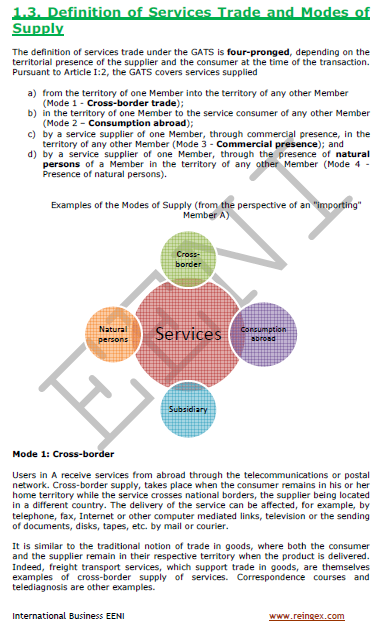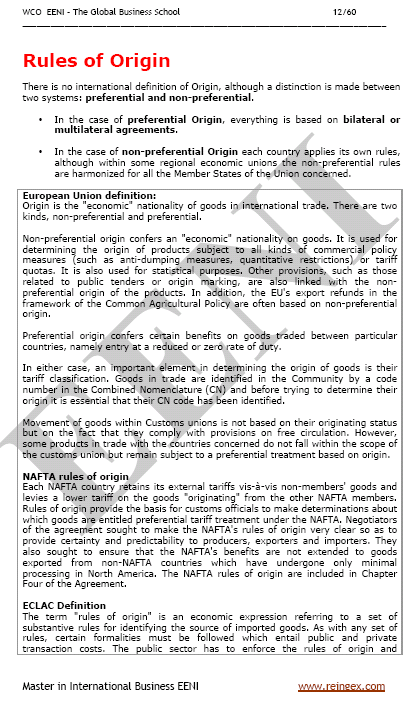Globalization (Bachelor in Inter-African Business)
Globalization and International Organizations (Bachelor of Science in Inter-African Business, e-learning, first semester)
| Bachelor of Science in Inter-African Business |
| Bachelor of Science in International Trade |

Subject - “Globalization and International Organizations” (6 ECTS) - Online Bachelor of Science in Inter-African Business (first semester).
The objectives of the subject “Globalization and International Organizations”:
- To understand the concept of the globalization and its repercussion on the international business
- To understand the International Trade Liberalization and the role of the WTO
- To determine the positive and negative effects of Globalization
- To know the trends towards the regionalism
- To understand the different regional trade agreements and its implications for global and regional trade
- To analyze the historical world trade development in the last decades
- To know the role of the international economic institutions (WTO, IMF, WB...) in the globalization process
- To know the state of the World
Syllabus of the Program: Globalization
- Globalization and International Business
- Economic Areas of the Globalization
- Global Economy
- FDI
- Delocalization and Globalization
- International Trade in merchandises and services
- Emerging and Frontier Markets
- BRICS Countries (Brazil, Russia, India, China, South Africa)
- The “Chinese Syndrome”
- Globalization and Regionalism
- Regional and Bilateral Trade Agreements
- European Union and Globalization
- Financial, cultural and political aspects of the Globalization
- Human development and Globalization
- Global economic crisis
- State of the World. Regional Analysis:
- Africa: the next emerging continent
- Asia
- Europe
- America
- Arab Countries
- Anti-Globalization
Objectives of the Program “Globalization”:
- To understand the concept of Globalization and their implications for International Business
- To understand the International trade Liberalization in services and merchandises
- To determine the positive and negative effects of Globalization
- To know the trends towards the regionalism
- To analyze the historical world trade development in the last decades
- To know the role of the international economic institutions in the globalization process
- To know the state of the World
Syllabus of the Program: The UN.
- Introduction to the Organization of the UN
- Structure and organization of the UN
- The main agencies of the UN
- Specialized institutions, programs and agencies of the UN
- Secretary of the UN
- Economic and Social Council (ECOSOC)
- United Nations System
- Human development and the UN
- Millennium Development Goals
- Global Compact of the UN
- UN Convention Against Corruption
- Convention for the Suppression of the Traffic in Persons and the Exploitation of the Prostitution
- Supplementary Convention on the Abolition of Slavery
Objectives of the Program “United Nations”:
- To understand the objectives and structure of the UN
- To know the function of the Economic and Social Council (ECOSOC)
- To analyze the UN System
- To understand the role of the UN in relation to the human development in the World
- To know the specialized institutions, programs, conventions and agencies of the UN
- To know how to analyze the socio-economic information offered by the different portals of the UN
- To analyze the role of the International Trade Centre (ITC) of the UN
International trade Centre (ITC) of the UN.
- Introduction to the International Trade Centre (ICC INTRACEN)
- SME Export promotion from development countries
- Trade information
- Market Analysis and Development
Conference on Trade and Development (UNCTAD) and Foreign Direct Investment (FDI)
- Conference on Trade and Development of the UN (UNCTAD) and FDI
- Inward and Outward Index
- Foreign Direct Investment Methodology
- World Investment Report
Syllabus of the Program: World Trade Organization
- Introduction to the WTO
- From the GATT to the WTO
- General Agreement on Trade in Services (GATS)
- Agreement on International Trade-Related Aspects of Intellectual Property Rights (TRIPS)
- Principles of the international trade system
- WTO's agreements;
- Tariffs
- Services
- Standards and Safety
- Textiles
- Agriculture
- Subsidies
- Anti-dumping
- Non-tariff Barriers. Technical Barriers to Trade
- Intellectual Property
- Regional Trade Agreements
- Environment and the WTO
- Investments and the WTO
- E-commerce
- Regionalism and the WTO
- Doha Agenda
- World International Trade Report
Objectives of the Program “World Trade Organization”:
- To understand the objectives of the WTO
- To understand the principles of the international trade system
- To analyze the agreements of the WTO (customs duties, agriculture, services, Import Licensing procedures...) and their implications for the International Trade
- To explore the rules on customs valuation
- To understand the General Agreement on Trade in Services
- To know how to interpret the World Trade Report of the WTO
Syllabus of the Program: World Bank (WB).
- Introduction to the World Bank
- Organization and objectives of the WB
- Role and mission of the World Bank
- World Bank and the Millennium Development Goals
- World Bank operations:
- Fund generation
- Loans
- Trust funds
- Grants
- Doing Business with the World Bank
- International Bank for Reconstruction and Development
- International Development Association
- World Development Indicators
Objectives of the Program “World Bank (WB)”:
- To understand the objectives, structure and functions of the World Bank
- To explore the areas of cooperation of the World Bank
- To analyze the loans granted by the World Bank
- To know the World Bank related institutions: the International Development Association, the International Bank for Reconstruction and Development.
- To understand the World Bank projects
Syllabus of the Program: International Monetary Fund (IMF).
- Introduction to International Monetary Fund (IMF)
- Objectives and activities of the IMF
- Activities of the International Monetary Fund:
- Supervision
- Technical assistance
- Financial assistance
- International Monetary Fund and the global economic stability
- Vulnerability indicators
- Global economic crisis
- International Monetary Fund and the WB
- International Monetary Fund and the WTO
- Special Drawing Rights (SDR)
Objectives of the Program “International Monetary Fund (IMF)”:
- To understand the objectives and organization of the IMF
- To analyze the main activities of the IMF (supervision, technical and financial assistance)
- To understand the concept of “Special Drawing Rights (SDR)”
- To know the role of the IMF in the global economic crisis and financial stability
- To analyze the role of the International Monetary Fund in the world trade
Syllabus of the Program: Organization for Economic Cooperation and Development (OECD).
- Introduction to the OECD.
- History of the OECD
- Structure of the OECD
- Analysis and studies of the OECD
- Economic prospects of the Organization for Economic Cooperation and Development
Objectives of the Program “Organization for Economic Cooperation and Development (OECD)”:
- To understand the objectives of the Organization for Economic Cooperation and Development
- To know how to analyze the Economic Reports of the OECD
- To know the Anti-corruption Measures of the OECD
Syllabus of the Program: Organization International of the Francophonie (OIF).
- Introduction to the Organization International of the Francophonie (OIF)
- Summit of the Francophonie
- Member countries of the Organization International of the Francophonie
- Francophonie: economy and Globalization
Syllabus of the Program- Community of Portuguese-speaking Countries (CPLP).
- Introduction to the Community of Portuguese-speaking Countries CPLP
- Portuguese in the World
- Institute Camões

ECTS = European Transfer and Accumulation System

Samples: Globalization and International Organizations (Bachelor of Science in Inter-African Business, e-learning, first semester).




Language of the subject “Globalization and International Organizations” of the Bachelor of Science (first semester):  or
or  EENI
EENI  EENI
EENI  EENI.
EENI.
(c) EENI Global Business School (1995-2024)
We do not use cookies
Top of this page

